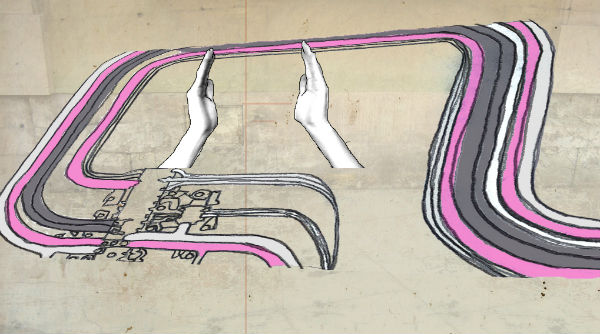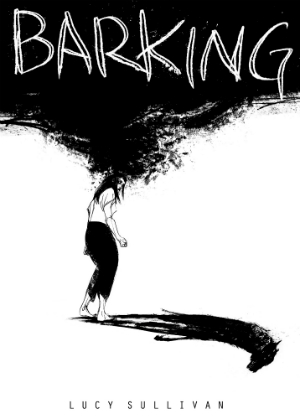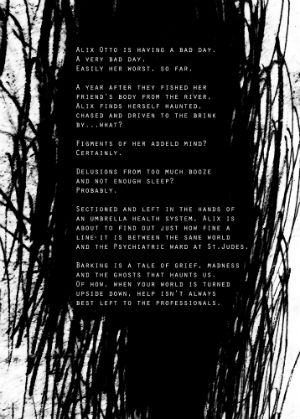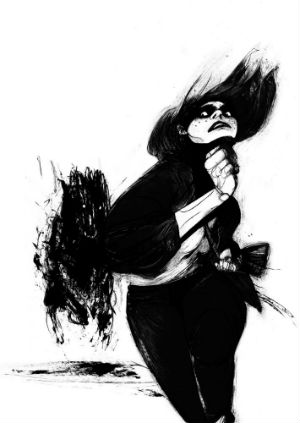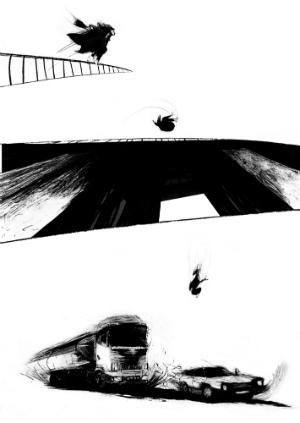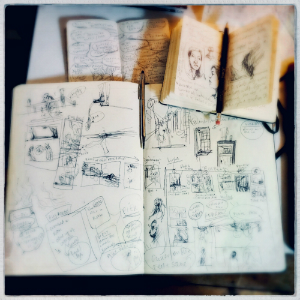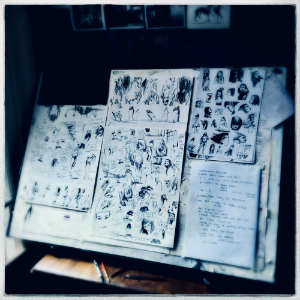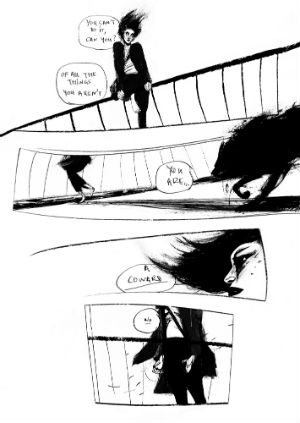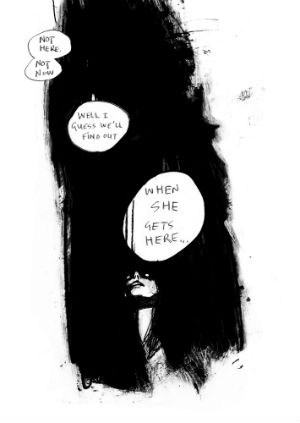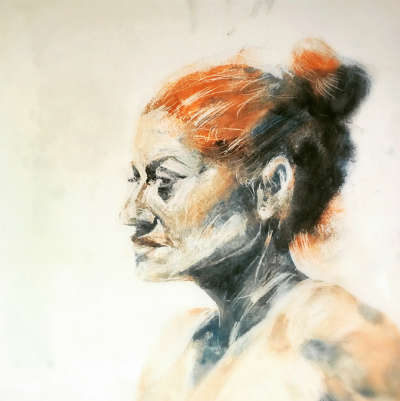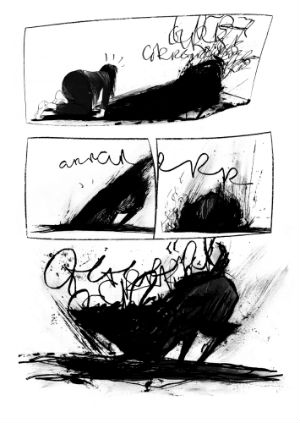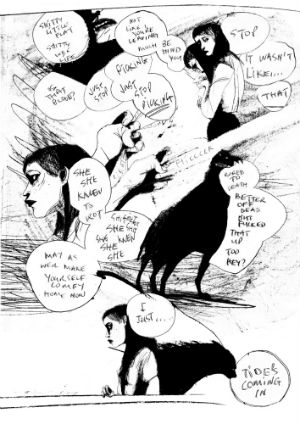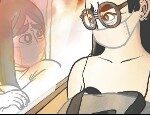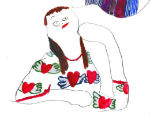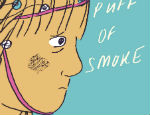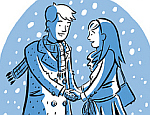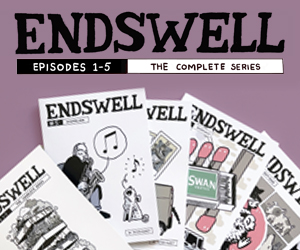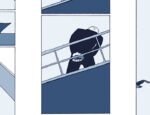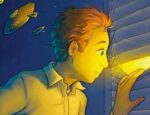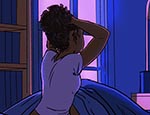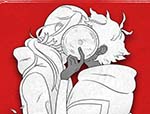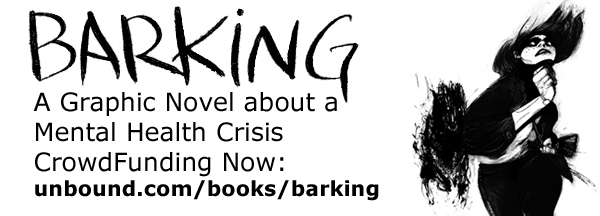
Over the last year or so, we’ve been following a number of crowdfunding campaigns here at Broken Frontier for the Unbound Books line of graphic novels – beginning with an interview with Commissioning Editor Lizzie Kaye here in March about Unbound’s unique publishing model. From Ram Venkatesan and Anand Radhakrishnan’s Grafity’s Wall to Jessica Martin’s Life Drawing: A Life Under Lights to Wallis Eates’s Like an Orange they’ve been building up a distinctive line-up of work that embodies notably diverse subject matter and different approaches to the page.
Today we’re taking some time to talk to Lucy Sullivan, another Unbound creator eager for support for a very impressive looking debut graphic novel that, in its exploration of grief and mental health issues, fits firmly into the graphic medicine strand of comics. Barking mixes allegory and personal experience in its story of Alix Otto – a woman haunted by recent tragedy. Lucy talks to us today about her route into comics, her unforgettably affecting imagery and the power of graphic medicine…
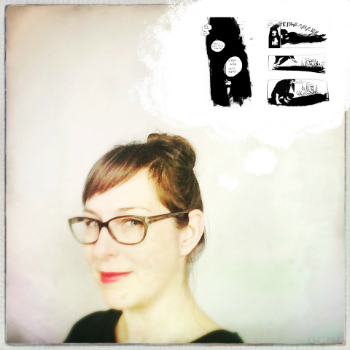 ANDY OLIVER: Before we talk about comics could you tell us a little about your own artistic background and your work in animation?
ANDY OLIVER: Before we talk about comics could you tell us a little about your own artistic background and your work in animation?
LUCY SULLIVAN: Drawing has always been my favourite thing to do but it wasn’t until I went to uni that I thought I could do it for a living. I studied Animation & Illustration at Kingston. I’d gone on the course wanting to improve my skills and make comics but that was still a bit of a dirty word in those days. Luckily I found animation had much in common and I fell in love with the process of hand-drawn 2D films.
After uni I co-directed and animated music videos for Coldcut and One Eskimo as part of a collective, Smuggling Peanuts. The latter won the ‘People’s Choice’ at the British Animation Awards 2008. But the music industry is ruthless and we were no match for it so I moved into storyboards and pre-visuals for film and TV. Whilst teaching life drawing and location drawing at universities and attempting to create a comic in my spare time.
Your graphic novel Barking is currently being crowdfunded via Unbound Books. What’s the book’s basic premise?
It’s the story of Alix Otto, who is having a very bad day. A year after her friend’s body is fished from the river Alix finds herself hounded and chased by a giant black dog. Things quickly escalate, she is caught by the police in a position she cannot explain and sectioned under the Mental Health Act. But the Black Dog is still there and he’s brought her dead friend with him. Left in the hands of an umbrella health system, Alix must take on the Black Dog and confront her past to find a way to have a future.
Examples of that Coldcut (above) and One Eskimo (below) work
Barking is informed by your own experiences with loss, grief and mental health crisis. Why did you choose to use an allegorical story to explore those themes?
Initially I wrote the story from my own perspective. My dad died suddenly when I was 23 and a year later I found myself in the grip of complete self-destruction and was diagnosed with depression and anxiety. It can be difficult to write honestly about those times and I found I was writing myself much nicer than I was so I re-wrote it as an allegory with a lead character to drive the narrative. I was very lucky not to be sectioned during that time but many people are. Writing as a parable allowed me to broaden the story, including experiences of other people I know and research I’ve done into mental health on how we view and treat it. I have some comments to make on that subject but I still want it to be an enthralling story whilst exploring the visual metaphors of madness and grief.
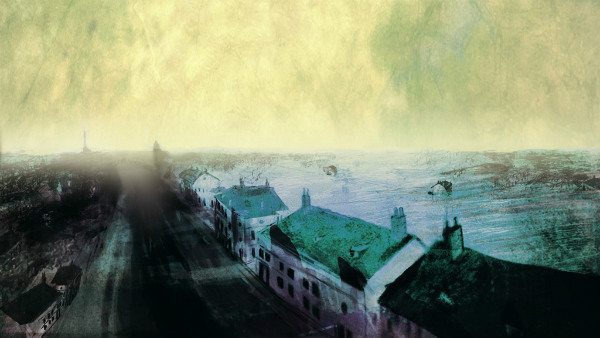
Some of Lucy’s pre-visuals work for TV – The Highway (above) and Winter’s Playground (below)
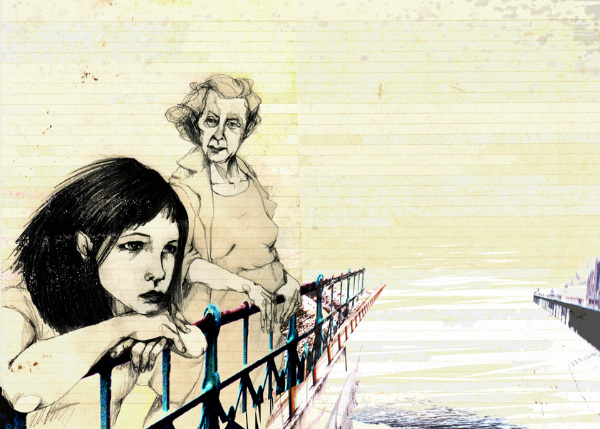
How did Unbound become interested in publishing Barking?
I’d produced the first two chapters and was sending out copies to publishers to see if I could get it picked up. I had plans to enter it in the Myriad First Graphic Novel Competition and if all else failed self-publish through Kickstarter. I’d been trawling through old Broken Frontier articles to gain any advice and whilst researching I came across Unbound via Grafity’s Wall. I liked their format and decided I would also try to pitch it to them. However it was really luck and chance that led to me meeting Unbound’s commissioning editor Lizzie Kaye.
Last summer my friend Nick Abadzis (Hugo Tate, Laika, Doctor Who) was visiting, I was telling him about what I was doing with Barking when he had a plan to help. Nick got me into the SelfMadeHero 10th anniversary party to try to meet people. That night I was thrilled to be chatting to so many comics stalwarts when Nick dragged me over and introduced me to Lizzie and you, Broken Frontier’s very own Andy Oliver.
Lizzie said Nick had been very complimentary about Barking so she’d be happy to look at it. I’d been following you both online and got quite overwhelmed, I thought Lizzie was just being polite and I actually tried to talk her out of it! I am truly my own worst enemy sometimes. Luckily she did read it and wanted to commission it.
The graphic medicine strand of comics has become a vitally important one in recent years in sharing personal experience on a crucially empathetic level. Why are comics such an effective medium for communicating those stories?
I’d been drawn to this strand through talks at Comica and Laydeez Do Comics. I read books such as Billy, Me & You, When David Lost His Voice and Days of the Elephant and found them extremely moving and although visually very different, the stories were equally profound. I’m a life-long comics fan so it seemed totally natural fit for my story. I think it’s the intimacy of reading comics that makes them such powerful communicators. Plus there are no boundaries to what you can say. Comic literate people tend to be very accepting of any reality you present them with and seem to naturally empathise with the characters in a story.
Haunting pages from Barking
Your art has a very dark and claustrophobic feel to it. Can you tell us a little about your artistic process and the mediums you work in?
I like to use a variety of materials as an artist but for Barking I wanted to create a sense of urgency so, perhaps foolishly, I decided to do all the sketching in biro. Once I’ve got an idea for the scene I grab my biro and sketch out the images. I have a Cross pen that I love drawing with and by skipping the pencil stage it means the images are imperfect. I think it adds a tension to the page, helping the reader to feel what Alix is going through.
I then scan the drawings into Photoshop and do the layout and inking digitally. I’d originally planned to do all the blacks in Oilbar but it was a messy and long winded process and once I’d found a similar Kyle’s Brush for the job I could work much faster. I find it easier to sketch people off the top of my head but was getting really frustrated with my environments so I’m doing those by going out on location and sketching on site.
Examples of Lucy Sullivan’s artistic process
It’s an usual process and quite uneconomical at times but it’s just how the story comes out of me. The personal nature of it means memories come flooding back when I’m drawing so I also like to write the scenes fairly vaguely so that if I sketch a better solution the scene can change. I’ve always produced artwork that has a sinister feel. I’m not at all sure why but luckily it fits this subject well!
Unbound campaigns are a longer-term process than some similar operations. How have you found the experience of being actively involved in promoting the project?
It’s a process I’m still getting to grips with. It’s great to be able to steer your project but it can be quite daunting. I’m still trying to find the work balance between creating the book and promoting it. But, it’s brilliant to be in contact with your readers during the process and the artistic freedom and support Unbound grants you is second to none.
Plus it’s like a friendly community with many of the other authors supporting each other. I feel very privileged to be a part of the growing graphic novel strand. I’m amongst some amazing talent like Wallis Eates, Jessica Martin and Ram V. There are exciting new authors joining all the time and getting the chance to work with Lizzie is fantastic. I hope some of Broken Frontier’s talented readership will consider pitching to them too.
Just like other crowdfunding platforms one of the draws of the Unbound campaigns is the different reward levels on show. What’s on offer from your crowdfunder outside of copies of the book?
Each 1st Edition Hardback pledge gets your name in the back of the book, an e-book copy and access to regular updates and sneaky previews. I’ll be sending out an exclusive digital edition of the first 2 chapters for supporters very soon. Reward levels include Sketched & Signed, Bookplates, Limited Edition Risographs (below right), Giclée Artwork prints from the book, the full collection of 1in4 Zines (4 short stories of mental health to accompany the book, below left), Dedicated Portraits, Prints of my Location Drawings and Original Animation Cells from the film I animated for the campaign.
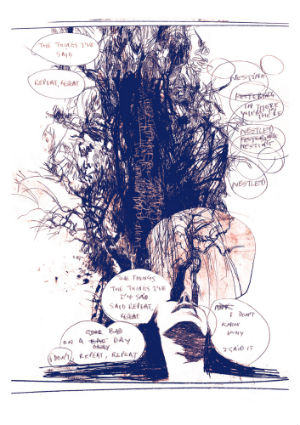
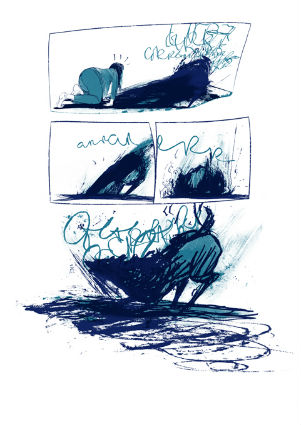
If that wasn’t enough for the very flush out there you can even sit for a portrait by me (example below). I’m currently tackling oil-painting and regularly attend life drawing groups and produce portraits in Oilbar. I promise it’ll be flattering and not at all sinister! You can see examples of all of these on my project page at Unbound. Plus a percentage of my profits from each book will be donated to a mental health charity so you will be doing a good deed too.
And, finally, give the Broken Frontier readership a soundbite pitch in 50 words or less as to why they should be backing Barking?
Barking will be a visually unique and engrossing story of grief, madness and the ghosts that haunt us. I hope it’ll be exciting and engaging to read and in doing so, open up the conversation around mental health and help to diminish the stigma. Please pledge to make it happen!
You can back Barking by Lucy Sullivan at Unbound Books here.
For more on the work of Lucy Sullivan visit her site here and follow her on Twitter here.
For more on Unbound visit their site here and follow them on Twitter here.





